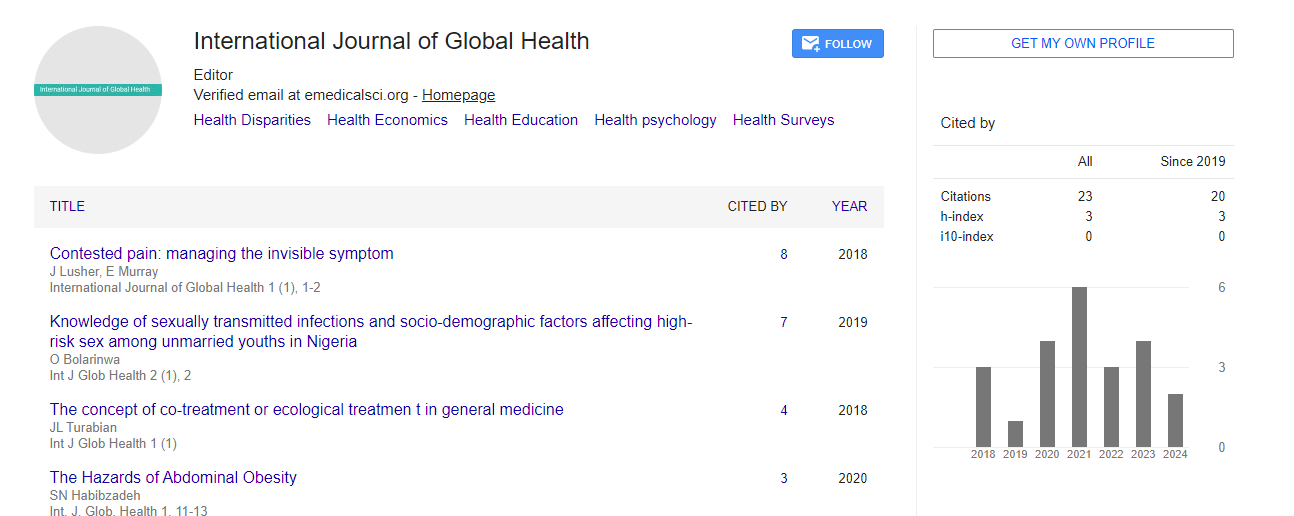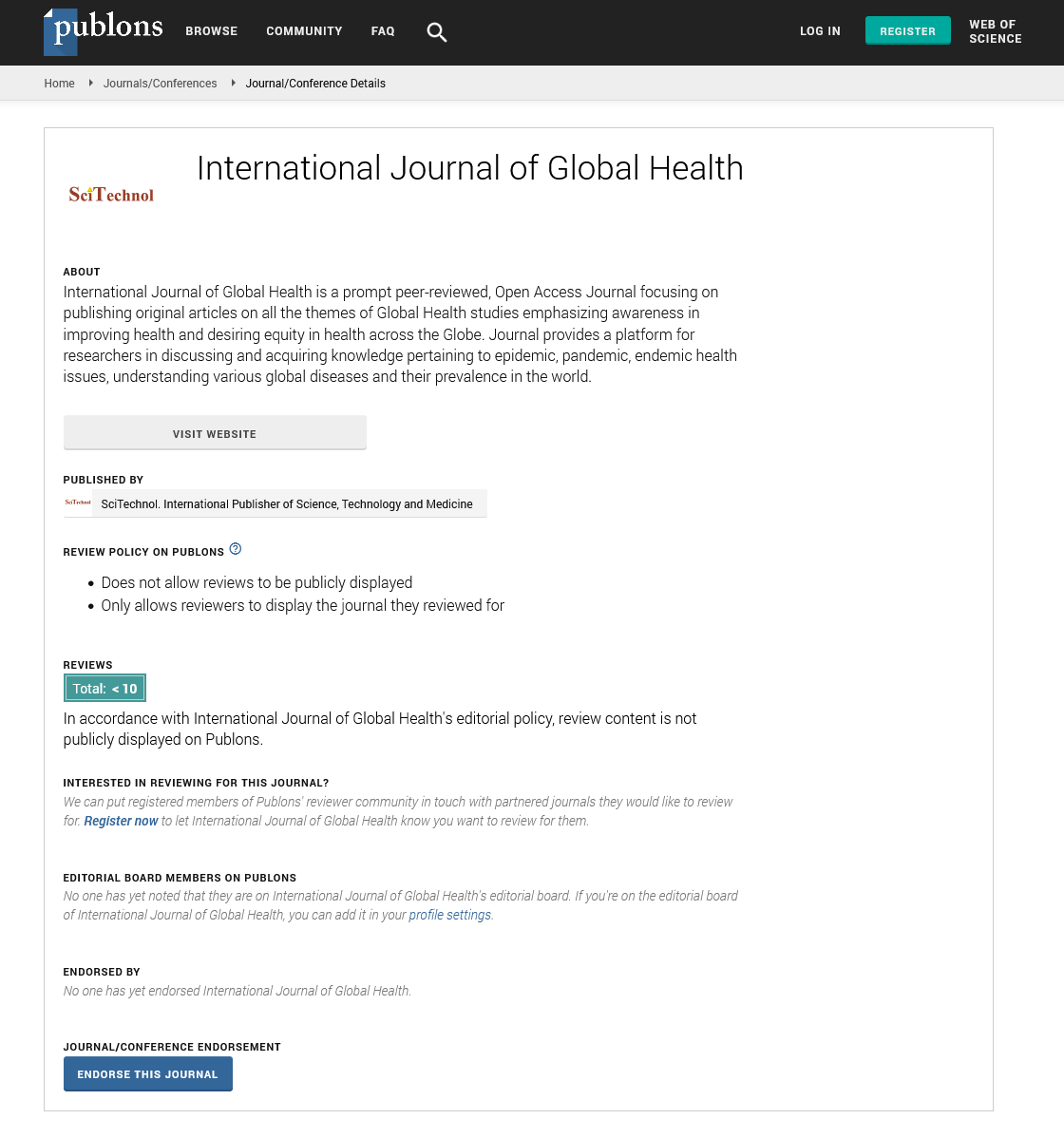Commentary, Int J Glob Health Vol: 6 Issue: 2
The Importance of Global Health in Ensuring Well-being for All
Jordan Simpson*
1Department of Global Health, Curtin University, Bentley, Australia
*Corresponding Author: Jordan Simpson,
Deaprtment of Global Health, Curtin
University, Bentley, Australia
E-mail: simpson@010.au
Received date: 24 May, 2023, Manuscript No. IJGH-23-107356;
Editor assigned date: 26 May, 2023, PreQC No. IJGH-23-107356 (PQ);
Reviewed date: 09 June, 2023, QC No. IJGH-23-107356;
Revised date: 16 June, 2023, Manuscript No. IJGH-23-107356 (R);
Published date: 23 June, 2023 DOI: 10.4172/Ijgh.1000181
Citation: Simpson J (2023) The Importance of Global Health in Ensuring Well-being for All. Int J Glob Health 6:2.
Description
Global health is an important aspect of the collective well-being that encompasses the efforts and initiatives aimed at improving health outcomes on a worldwide scale. It involves addressing health disparities, promoting disease prevention, strengthening healthcare systems, and fostering collaborations across borders. As the world becomes increasingly interconnected, global health takes on greater significance in safeguarding the health and prosperity of individuals and communities worldwide. This study explores the importance of global health in achieving a healthier and more equitable future for all.
Addressing health inequalities
One of the fundamental principles of global health is to address health inequalities, both within and between countries. While significant progress has been made in improving health outcomes over the years, stark disparities persist. Many regions still lack access to basic healthcare services, clean water, sanitation facilities, and nutritious food, resulting in increased susceptibility to diseases and poor overall health. Global health initiatives work towards reducing these disparities by focusing on delivering healthcare services, improving infrastructure, and promoting health education, particularly in resource-limited settings.
Disease prevention and control
Global health efforts are instrumental in preventing and controlling the spread of infectious diseases. Diseases such as HIV/AIDS, malaria, tuberculosis, and emerging viral outbreaks pose significant threats to global well-being. Through international collaborations, research, and the sharing of best practices, global health organizations enhance disease surveillance, develop effective vaccines, improve diagnostic capabilities, and strengthen healthcare systems’ capacity to respond to outbreaks. Investing in disease prevention saves lives, reduces healthcare costs, and promotes social and economic development.
Promoting health systems strengthening
Robust healthcare systems are vital for the effective delivery of healthcare services and the attainment of universal health coverage. Global health initiatives prioritize strengthening healthcare systems, particularly in low- and middle-income countries, by supporting the training of healthcare workers, improving infrastructure, enhancing supply chains for essential medicines, and promoting evidence-based policies. By investing in health systems, countries can ensure that everyone has access to quality healthcare, leading to improved health outcomes and increased resilience in the face of health crises.
Emerging global health challenges
In addition to traditional health concerns, global health also encompasses emerging challenges. Non-Communicable Diseases (NCDs) such as cardiovascular diseases, diabetes, cancer, and mental health disorders are on the rise globally, placing a significant burden on healthcare systems and economies. Global health initiatives recognize the importance of addressing NCDs through prevention strategies, early detection, and access to affordable treatment. Furthermore, climate change, urbanization, and population aging are additional challenges that impact global health. Tackling these complex issues requires collaborative efforts and interdisciplinary approaches that consider social, economic, and environmental determinants of health.
Global health diplomacy and partnerships
Global health necessitates collaboration among governments, international organizations, civil society, and the private sector. Global health diplomacy plays an important role in fostering partnerships and cooperation, facilitating the exchange of knowledge, resources, and technical expertise. Initiatives like the World Health Organization (WHO) bring together nations to address common health challenges, coordinate responses to global health crises, and establish international health regulations. By working together, countries can pool resources, share experiences, and collectively strive for improved health outcomes worldwide.
Conclusion
Global health is an essential component of the shared future, emphasizing the well-being of individuals and communities across the globe. By addressing health inequalities, preventing diseases, strengthening healthcare systems, and collaborating on emerging challenges, global health initiatives contribute to a healthier and more equitable world. As one can navigate through an increasingly interconnected world, recognizing the importance of global health and investing in its advancement will be a necessary in ensuring a brighter and healthier future for all. By prioritizing global health, one can pave the way for progress, resilience, and prosperity on a global scale.
 Spanish
Spanish  Chinese
Chinese  Russian
Russian  German
German  French
French  Japanese
Japanese  Portuguese
Portuguese  Hindi
Hindi 
